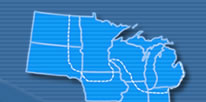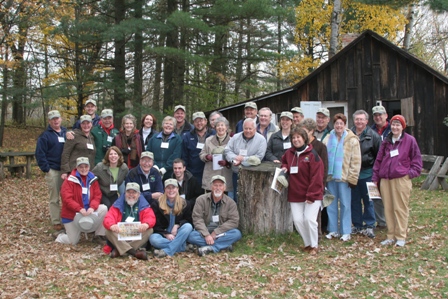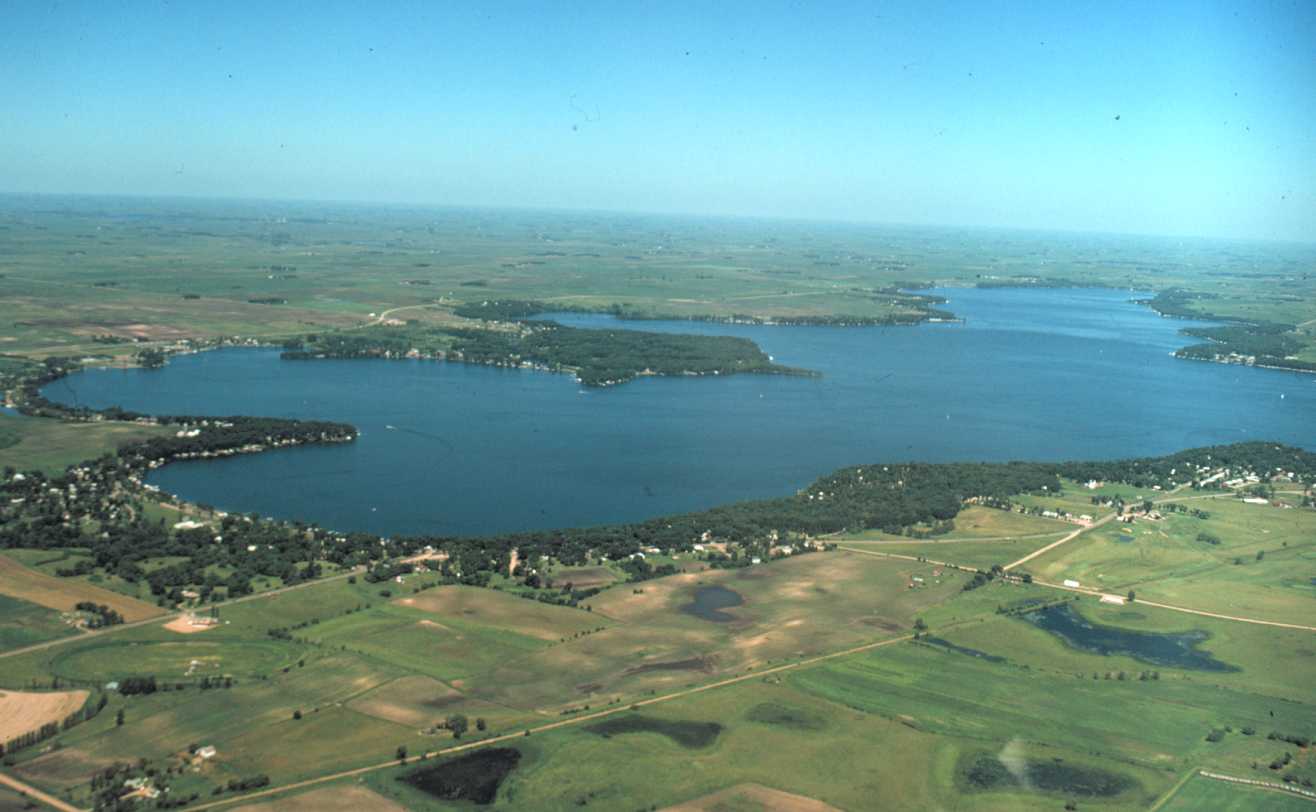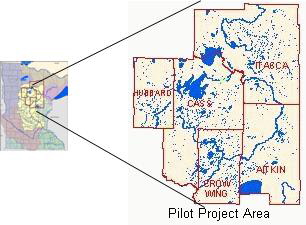



| Midwest Glacial Lakes Partnership Habitat |
The Need for a Lake-Focused Fish Habitat PartnershipNatural shorelines and in-lake structures such as aquatic plants and large woody habitat provide many benefits for fish, wildlife, and water quality. Many people take these benefits for granted and alterations to lake habitats and water quality caused by development and other land use changes are increasingly affecting the sustainability of healthy glacial lakes in the Midwest. Some consider glacial lakes to be among the most endangered of aquatic systems. Despite these challenges, a number of ongoing efforts are making a difference in the protection and restoration of fish habitat in glacial lakes. Here are several examples:Indiana: Lake Management GroupIndiana created the Lake Management Work Group by statute in 1997 to gather input on statewide lake management challenges and make recommendations to the state. A diverse group of 26 stakeholder representatives meets several times a year to collect public input, deliberate on lake management challenges, and recommend policy direction. This group provides an ongoing forum for legislators, lake associations, state and federal agencies, and related organizations to cooperatively work out solutions to lake management issues in the state. For more information, please visit: www.in.gov/legislative/igareports/agency/reports/LMWG01.pdfWisconsin: Lake Leaders InstitutePartnerships between natural resource agencies and local citizen-run organizations are essential to effective lake management. Thousands of elected and appointed volunteers serve as officers and committee chairs of lake and watershed organizations that deal with a host of complex issues. Turnover and recruitment of effective leaders to maintain these organizations is a common challenge.In 1998, Wisconsin began a program called the Lake Leaders Institute intended to "proactively develop a pool of committed and prepared leaders who could assume leadership roles in Wisconsin Association of Lakes, other statewide committees, county-wide associations of lakes and watershed teams just then being organized by the WI Dept. of Natural Resources." Wisconsin Lake Leaders Institute is designed to assist in developing and enhancing both technical and people skills of citizen leaders. The Institute also seeks to develop networks to share experiences and to encourage participants to learn from each other. Graduates of the program take on active citizen roles in their local lake, in county lake associations, on watershed management teams, and on statewide policy committees. The 178 graduates of Crew I, II, III, IV, V, and VI are making a difference. They have taken their new skills and personal connections back to their communities and are assisting in the job of preserving and protecting the waters. Graduates are getting involved at many levels. They have been elected to town boards, the Wisconsin Association of Lakes board, county lakes association boards and teams developing state water policy. Go to this link to learn more. www.uwsp.edu/cnr/uwexlakes/lakeleaders/who_lead.asp 
A graduating class at Aldo Leopold's "Shack" in Baraboo, WI. Iowa: "Working Priority" Lakes In fiscal year 2007, Iowa dramatically increased state investment in lake restorationto improve water quality and aquatic habitats in their state lakes, ponds, and reservoirs. The state prioritized 127 principal public lakes statewide to develop a list of 35 "working priority" lakes to focus their restoration efforts with the initial appropriation of $8.8 million. Priority ranking for lake restoration suitability was based upon a number of socio-economic, water quality, watershed factors. The ranking process resulted in a priority list of thirty-five lakes, which serves as a starting point for consideration of potential lake restoration projects. Projects are implemented at the watershed scale, working with landowners to address major source contributors to lake impairment. For more information, please visit
www.iowadnr.com/water/lakerestoration/index.html
In fiscal year 2007, Iowa dramatically increased state investment in lake restorationto improve water quality and aquatic habitats in their state lakes, ponds, and reservoirs. The state prioritized 127 principal public lakes statewide to develop a list of 35 "working priority" lakes to focus their restoration efforts with the initial appropriation of $8.8 million. Priority ranking for lake restoration suitability was based upon a number of socio-economic, water quality, watershed factors. The ranking process resulted in a priority list of thirty-five lakes, which serves as a starting point for consideration of potential lake restoration projects. Projects are implemented at the watershed scale, working with landowners to address major source contributors to lake impairment. For more information, please visit
www.iowadnr.com/water/lakerestoration/index.html Lake Okoboji, IA Minnesota: Alternative Shoreland Standards Minnesota engaged a diverse group of stakeholders in a five-county region of the state to develop a suite of science-based alternative shoreland standards that advanced shoreline protection over existing statewide minimum standards. The 34-member stakeholder advisory committee weighed various options that were based on scientific information for achieving riparian protection and restoration. These alternative standards are voluntary to adopt into local ordinances (as opposed to statewide mandatory minimum standards) and serve as a toolbox for local governments faced with the overwhelming challenge of managing rapid-paced conversion or redevelopment of lakeshore. For more informiaton, please visit
www.dnr.state.mn.us/waters/watermgmt_section/shoreland/shoreland_rules_update.html
Minnesota engaged a diverse group of stakeholders in a five-county region of the state to develop a suite of science-based alternative shoreland standards that advanced shoreline protection over existing statewide minimum standards. The 34-member stakeholder advisory committee weighed various options that were based on scientific information for achieving riparian protection and restoration. These alternative standards are voluntary to adopt into local ordinances (as opposed to statewide mandatory minimum standards) and serve as a toolbox for local governments faced with the overwhelming challenge of managing rapid-paced conversion or redevelopment of lakeshore. For more informiaton, please visit
www.dnr.state.mn.us/waters/watermgmt_section/shoreland/shoreland_rules_update.html
Michigan: Eco-TeamsMichigan has established regional Eco-Teams to coordinate agency policies, decisions, and actions related to managing inland lakes and other natural resources. The ultimate goal is the establishment of a sustainable program of ecosystem management. An early task facing these teams has been the development of an appropriately broad set of ecosystem indicators that can be used to evaluate current ecosystem status, to identify major threats, and to propose sustainable ecosystem management and a number of indicators. Michigan is developing databases to calculate the indicators for evaluating the extent to which the Criteria are being applied. For more information, please visit www.michigan.gov/dnrIllinois: Conservation 2000In 1995 the Illinois General Assembly responded to the recommendations of the Illinois Conservation Congress by authorizing Conservation 2000 (C2000), a broad-based approach to managing the state's privately owned natural resources. Major components of C2000 include the Critical Trends Assessment Project (CTAP) which uses a science-based landscape level approach to identify and monitor resource rich areas throughout the state; and coalescing diverse local stakeholder groups to form watershed-based ecosystem partnerships. C2000 provides competitive grants to the partnership for habitat restoration, land acquisition, planning, education, and research projects on private lands. For more information, please visit dnr.state.il.us/OREP/pfc/ |

